Each day, we:
- Track the status of reopening in all 50 states.
- Compare the status of one industry or activity across the country.
- Provide in-depth summaries of the latest reopening plans.
- Give you the latest stories on other reopening plans and ideas.
Want to know what happened Friday? Click here.
The next two days
What is reopening in the next two days?
June 30
- New York (Democratic trifecta): Gov. Andrew Cuomo (D) announced the Western New York region will move to Phase IV of the state’s reopening plan starting June 30.
- Rhode Island (Democratic trifecta): Gov. Gina Raimondo (D) announced Rhode Island will move to the third phase of reopening on June 30. Phase 3 will allow gatherings of up to 25 people indoors and 50 outdoors. It will also allow entertainment businesses (like bowling alleys and movie theaters) and some larger events (like concerts and festivals) to reopen with restrictions. Raimondo said Rhode Island will require travelers from states with 5% or greater positivity rates to self-quarantine for 14 days or be able to present proof of a recent negative coronavirus test.
July 1
- Maine (Democratic trifecta): Effective July 1, the following businesses will be permitted to reopen or expand operations: indoor amusement facilities (e.g., bowling alleys; 50 people maximum); movie theaters (50 people maximum); outdoor amusement facilities (25% capacity); performing arts venues (50 people maximum); casinos; overnight summer camps; and spas and close-contact personal services (e.g., nail services; 50 people maximum).
- Oregon (Democratic trifecta): Gov. Kate Brown (D) announced Clatsop County will require face coverings in indoor public spaces, effective July 1. Face coverings have been required in Multnomah, Clackamas, Washington, Marion, Polk, Hood River, and Lincoln counties since June 24.
- Vermont (divided government): Beginning July 1, out-of-state visitors arriving from low-risk counties in Pennsylvania, New Jersey, Delaware, Maryland, Washington D.C., Virginia, and West Virginia in a personal vehicle will no longer need to quarantine for 14-days after arriving in Vermont. Vermont residents who visit those counties and then return home will also no longer need to quarantine.
- Virginia (Democratic trifecta): Virginia will enter Phase 3 of its reopening plan on July 1. Retailers, restaurants, and bars will no longer be subject to capacity restrictions, and entertainment venues and gyms will be permitted to operate at high capacities. The limit on gatherings will increase to 250 people.
Since our last edition
What is open in each state? For a continually updated article on reopening status in all 50 states, click here. For our last edition, click here.
- California (Democratic trifecta): On June 27, Gov. Gavin Newsom (D) ordered seven counties (including Los Angeles) to close bars. Newsom recommended that nine additional counties also close bars.
- Kentucky (divided government): Effective June 29, the following businesses are allowed to reopen or expand operations: restaurants and bars (50% capacity); venues and event spaces (50% capacity); and public swimming and bathing facilities (subject to a capacity formula detailed here). Social gatherings of up to 50 people are now permitted.
- New Hampshire (divided government): Effective June 29, several industries are allowed to reopen or increase capacity in the state: Movie theaters and performing arts (reopen at 50% capacity), amusement parks (reopen at 25% capacity), overnight children’s camps (reopen), and hotels (from 50% capacity to regular capacity).
- New Jersey (Democratic trifecta): On June 26, the New Jersey Department of Education released a 104-page reopening plan that includes social distancing guidelines and a face-covering requirement for teachers and staff. Gov. Phil Murphy (D) said that schools would reopen to in-person instruction this fall. Murphy also indefinitely postponed reopening indoor dining, which was set to occur on July 2. Shopping malls are reopening at 50% capacity on June 29.
- Utah (Republican trifecta): Gov. Gary Herbert (R) approved a plan by the Utah State Board of Education for reopening schools in the fall. The Board is requiring all public schools to create and post a reopening plan online by August 1.
- Washington (Democratic trifecta): On June 27, Gov. Jay Inslee (D) said the state would stop counties from advancing to Phase 4 of the reopening plan. Although no counties had been moved into Phase 4 as of the time of the announcement, eight were scheduled to do so.
Update on stay-at-home orders
Forty-three states issued orders directing residents to stay home except for essential activities and the closure or curtailment of businesses each state deemed nonessential. Seven states did not.
As of June 27, stay-at-home orders have ended in 40 states. Nineteen of those states have Republican governors and 21 have Democratic governors (including Wisconsin, where the state Supreme Court invalidated the stay-at-home order).
The three states with active stay-at-home orders have Democratic governors. They are (with expiration date):
- New Mexico (June 30)
- California (no set expiration date)
- Kentucky (no set expiration date)
Here's which stay-at-home orders have expired.
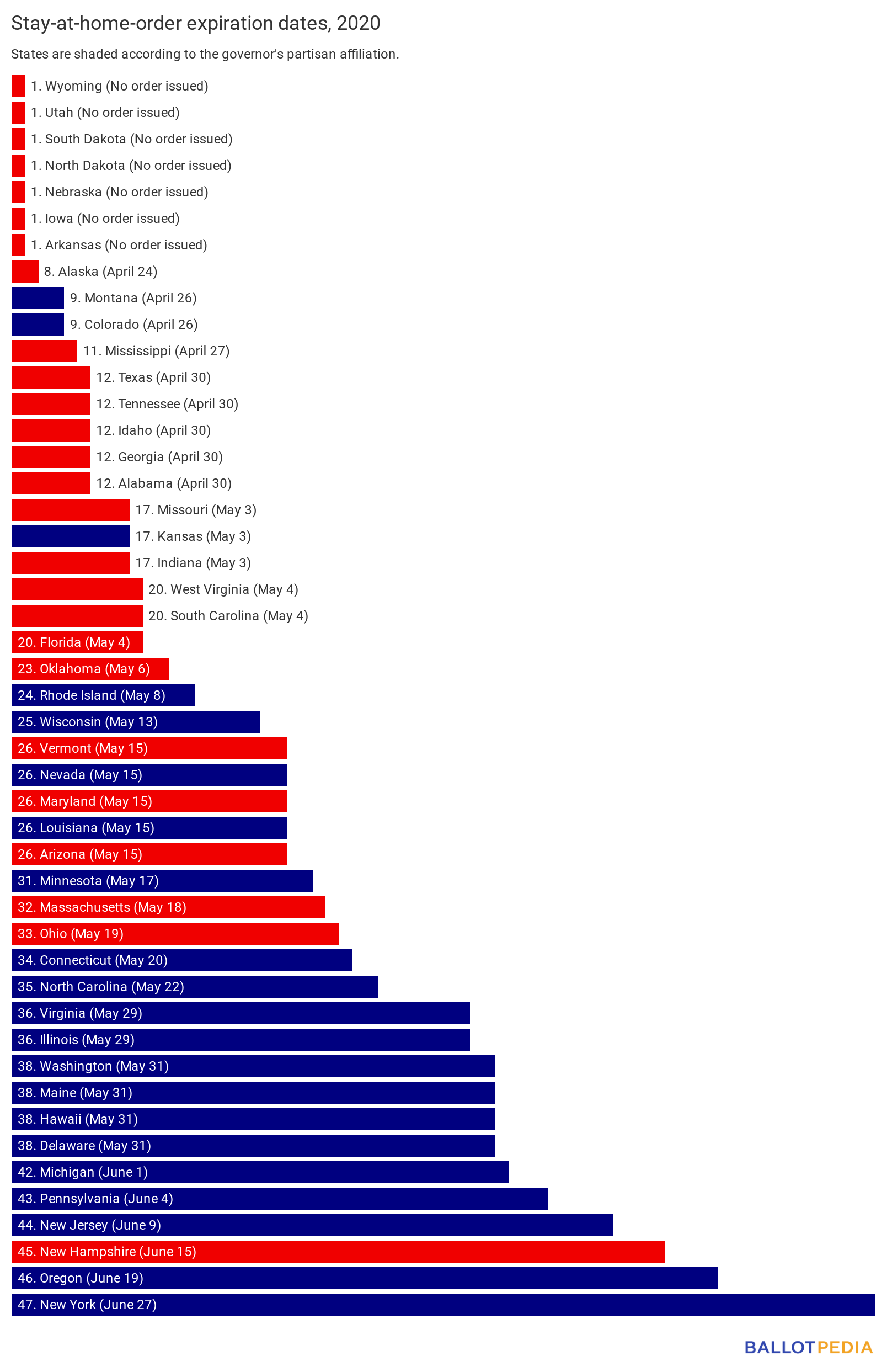
Tracking industries: Bars
All 50 states are reopening in some way. Here, we give the status of one industry or activity across the states. Today’s question: in which states may you go to a bar?
We last looked at bars in the June 17th edition of the newsletter. Since then, five states have opened bars, while two states have closed them. Here’s what has changed:
- Closed bars that were previously open: Florida, Texas
- Opened bars that were previously closed: Colorado, Hawaii, Kentucky, New Jersey, and Tennessee
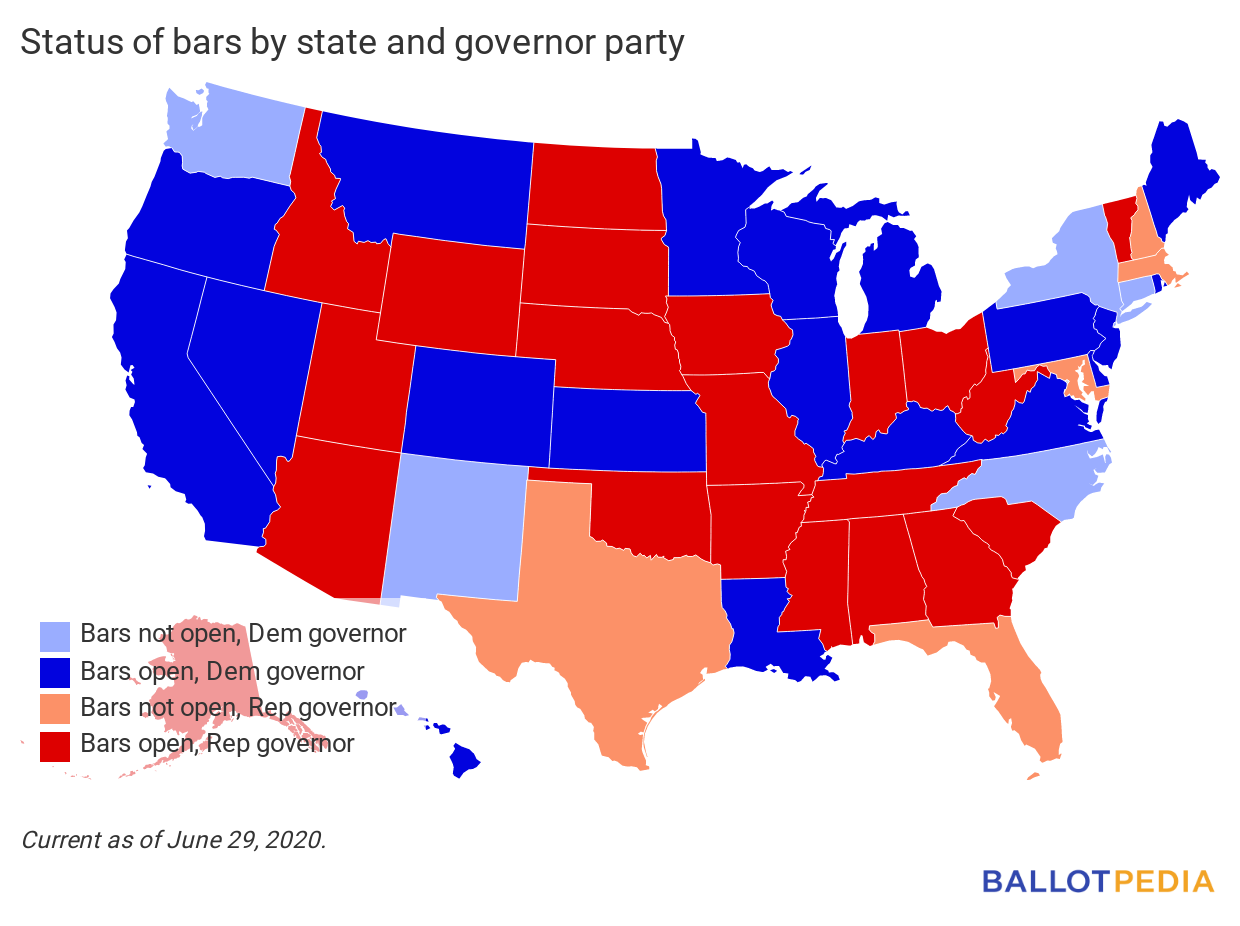 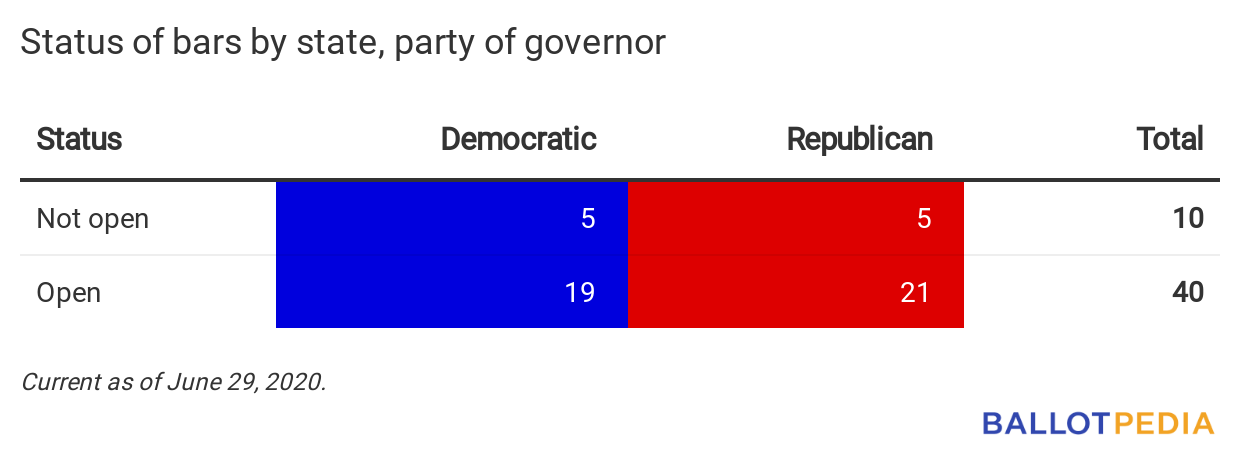
|
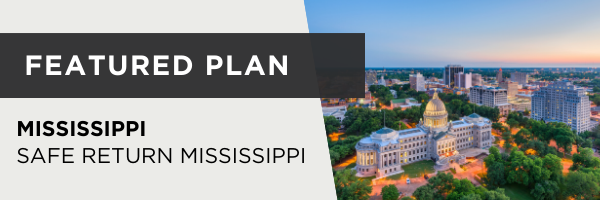
This is an in-depth summary of one of the latest reopening plans. Is there a plan you'd like us to feature? Reply to this email and let us know. Click a state below to read a previous Featured Plan.
On April 24, Mississippi Gov. Tate Reeves (R) signed Executive Order No. 1477, the Safer At Home order that began the process of reopening the economy. The order took effect on April 27 and was originally set to expire on May 11.
In announcing the order, Reeves said, “This disease has not hit every American fairly. And the economic damage has not hit every American fairly. Wall Street and Hollywood will be fine. Mississippi small businesses and workers are not. That’s who has been asked to shoulder the country’s burden. It’s not fair, and it’s not right. We are starting to re-open our economy. It’s not a light switch that only goes on and off. It’s a dimmer. We can take measured steps to make life better.”
The order said Mississippi could begin reopening because:
“...the incidences of infection in Mississippi have stabilized; there is decreased utilization of hospital resources; a robust testing system is in place capable of promptly detecting any increase in the rate of infection; the healthcare system is capable of treating persons with the COVID-19 and has the capacity to promptly react to any increase in incidences; and the State has in place a plan to rapidly scale up healthcare capacity in the event of an increase in the rate of infection…”
On May 7, Reeves announced that the state was entering Stage 2 of reopening. Reeves replaced the Safer At Home order with the Safe Return order. According to Reeves, this was the final stage of reopening.
Context
- On April 1, Reeves issued a statewide shelter-in-place order, requiring residents to stay at home unless performing essential activities. The order was originally scheduled to expire on April 20. On April 17, Reeves announced he was extending the shelter-in-place order through April 27. He also announced that nonessential businesses, like clothing stores and florists, could begin offering curbside or delivery services.
- As of June 28, Mississippi had reported 26,400 confirmed COVID-19 cases and 1,042 deaths. Mississippi had an estimated population of 2,976,149 as of July 2019. For every 100,000 Mississippians, the state had 887 cases and 35 deaths.
- Mississippi has a Republican trifecta. Republicans hold the governorship and have majorities in the state House and Senate.
Plan details
When Reeves extended the statewide shelter-in-place order on April 17, he also eased, for the first time, a few restrictions on nonessential businesses. Beginning that day, nonessential businesses like clothing stores and florists could offer curbside pickup or delivery services. Additionally, Reeves reopened lakes and beaches across the state for fishing and other leisure activities, so long as social distancing was followed.
Stage 1 of Safer At Home
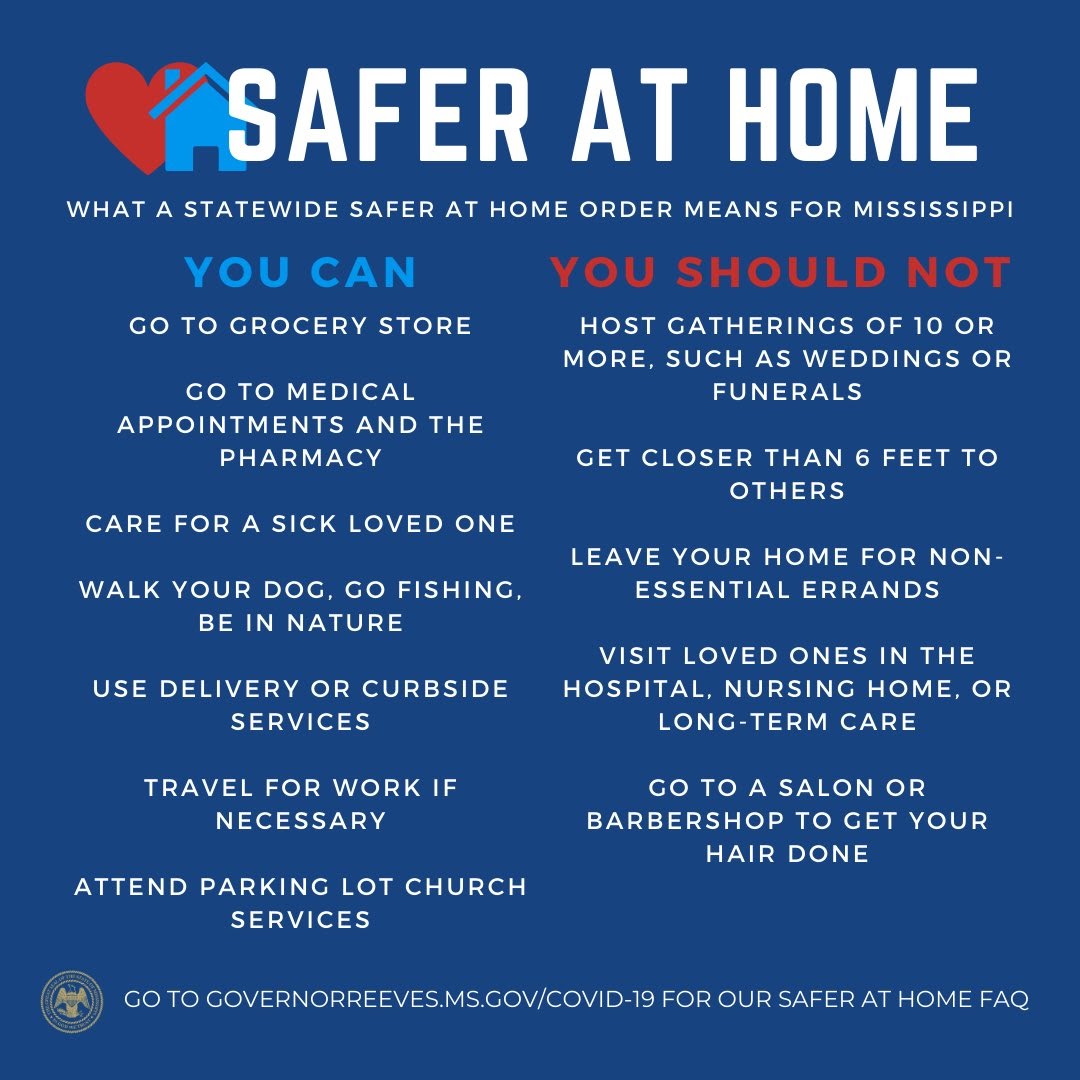
Mississippi entered the first stage of reopening on April 27. Although the shelter-in-place order had expired, the 10-person limit on gatherings remained in place. Vulnerable and elderly individuals were encouraged to continue following the guidelines set out in the shelter-in-place order.
In Stage 1, hospitals and dentists were allowed to resume performing elective surgeries and other medical and dental procedures. Retail businesses could reopen at 50% capacity, so long as they made hand sanitizer available to customers at store entrances.
The following businesses were prohibited from reopening to in-person activities:
- Places of amusement or entertainment, such as movie theaters and museums.
- Close contact businesses like salons, gyms, tattoo parlors, and other personal care and personal grooming facilities (these businesses were permitted to sell products through curbside pick-up or delivery).
- Restaurants and bars (curbside pick-up, drive-thru, or delivery services only).
Stage 2
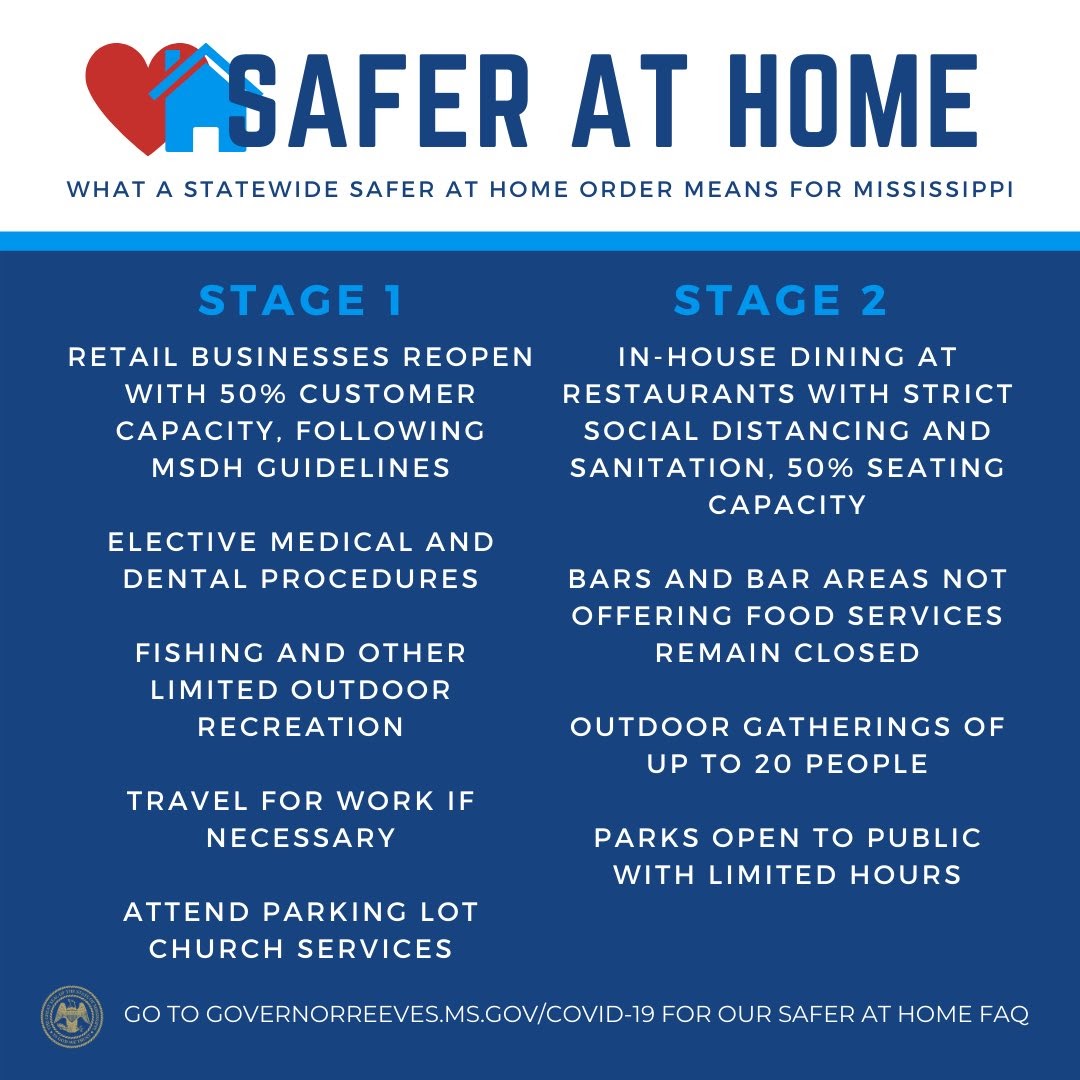
On May 4, Reeves signed Executive Order No. 1478, which extended the Safer at Home order and further eased restrictions. The order went into effect May 7, at which point the state entered Stage 2 of reopening.
In the second stage, restaurants were permitted to offer indoor and outdoor dining at 50% capacity. Bars, and bar areas, could not reopen. Other rules required deep-cleaning and sanitizing the entire establishment before reopening, and required employees to wear face coverings when interacting with patrons.
Indoor gatherings were still restricted to 10 people, but outdoor gatherings could expand up to 20 people. Parks, including state, municipal, and private parks, were allowed to reopen between 9:00 a.m. and 7:00 p.m. for recreational activities, so long as social distancing was followed.
On May 8, Reeves signed Executive Order 1480, which once again extended the statewide Safer at Home order and eased restrictions on some businesses.
Under this order, close contact businesses like salons and barbershops were permitted to reopen. Exercise facilities, like gyms, were allowed to reopen. Waiting areas were closed, and only one customer at a time was allowed in a salon or barbershop. Gyms were limited to 30% capacity.
Reeves issued Executive Order 1486 on May 15, allowing tattoo parlors to reopen with restrictions. The order also allowed restaurants that do not serve alcohol to offer indoor dining 24 hours a day and permitted dance studios to reopen subject to the same restrictions as gyms.
On May 22, Reeves extended the Safer at Home order through June 1 and permitted more businesses to reopen.
Under Executive Order No. 1487, outdoor recreational facilities were allowed to reopen with restrictions, and schools could reopen weight rooms and training facilities, so long as they followed the guidelines already in place for gyms. Additionally, team practices could resume at outdoor sports complexes.
Safe Return
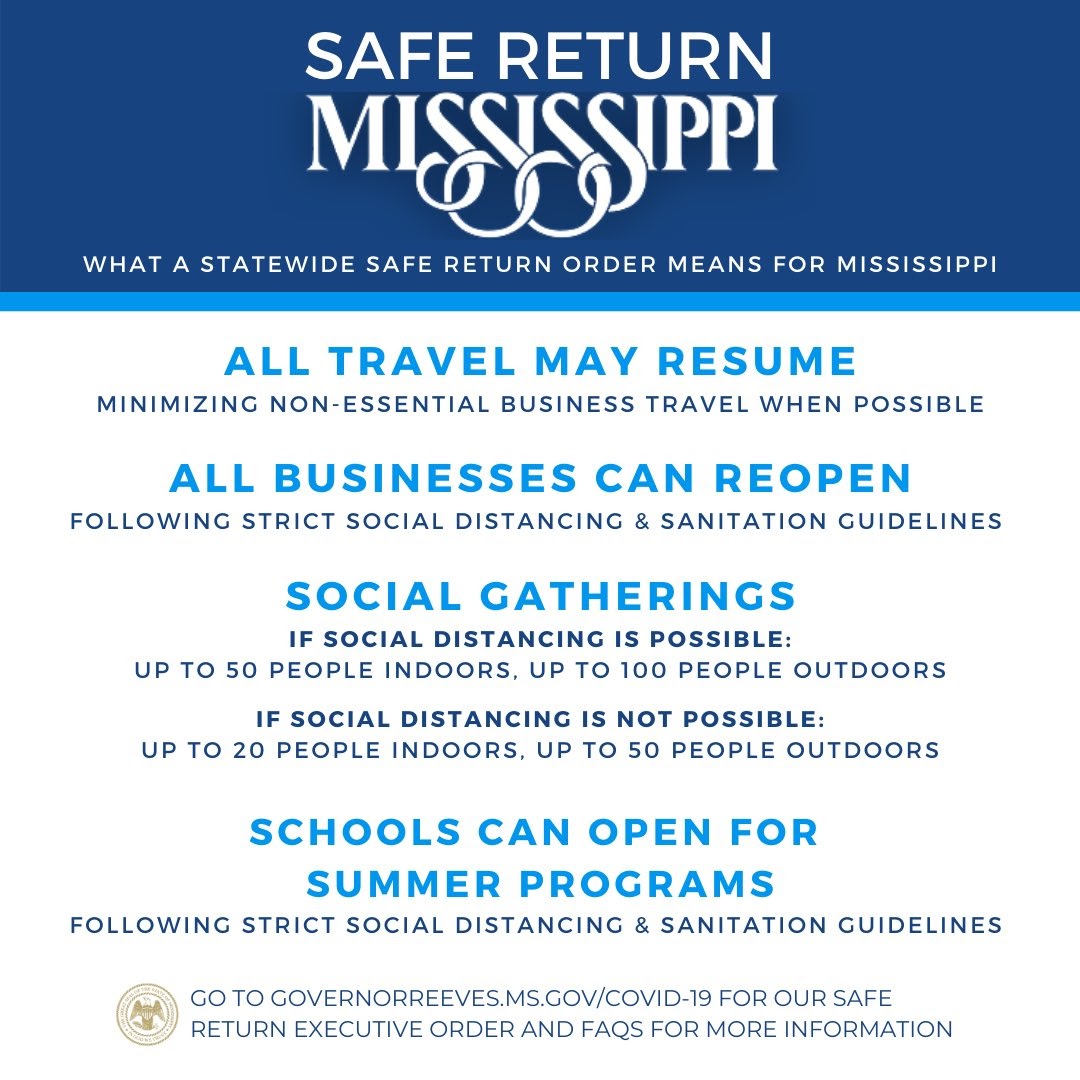
On May 27, Reeves announced the Safe Return order would replace the Safer at Home order on June 1. He said Safe Return was the final stage of reopening.
The Safe Return order permitted indoor gatherings to increase to a maximum of 50 people and outdoor gatherings to increase to a maximum of 100 people. If social distancing was not possible, indoor gatherings were limited to 20, while outdoor gatherings were limited to 50 people.
The order allowed all businesses to reopen in Mississippi, including:
- Bars (50% capacity)
- Indoor places of amusement, including bowling alleys and playgrounds (50% capacity)
- Youth sports (no more than 100 people allowed at a game, including players, coaches, and fans)
- Movie theaters (50% capacity)
- Libraries and museums (50% capacity)
On June 10, Reeves announced he was extending Safe Return through June 29, with modifications. The revised order allowed gyms and fitness facilities to operate at 50% capacity and allowed indoor and outdoor arenas and venues to operate at 50% capacity.
On June 26, Reeves announced he was extending the “Safe Return” order through July 6, with modifications. The revised order allows concession stands at outdoor sports arenas to open and permits pools to be open 24 hours a day.
Additional activity
In this section, we feature examples of activities by other federal, state, and local governments and influencers relevant to recovering from the pandemic.
- On June 26, Judge Dolly Gee, of the U.S. District Court for the Central District of California, ordered Immigration and Customs Enforcement (ICE) to transfer migrant children held at ICE Family Residential Centers (FRCs) to their families or sponsors by July 17. The order is the result of a complaint filed on March 26, in which plaintiffs, representing detained minors in a longstanding class action, alleged that continued detention of the minors "in congregate detention facilities in the face of the COVID-19 pandemic and public health national emergency" violated the Flores settlement. The Flores settlement is a 1997 court-supervised stipulated settlement agreement which governs the detention conditions and treatment of noncitizen migrant children held in federal custody. Gee’s order is limited to minors held at FRCs for more than 20 days. It provides that removal "shall be undertaken with all deliberate speed." The order goes on to state that before removal, "ICE shall urgently enforce its existing COVID-19 protocols," including social distancing, masking, and enhanced testing at all detention centers. Gee had previously ordered the federal government, on April 24, to "continue to make every effort to promptly and safely release" the minors, an order ICE appealed to the U.S. Court of Appeals for the Ninth Circuit on June 23. Gee was appointed to the court by President Barack Obama (D).
- The city of Jacksonville, Florida, instituted a face mask requirement. Mayor Lenny Curry (R) said he decided to issue the order after both the Navy and Coast Guard instituted mask requirements at their bases in the city. The Republican National Convention is scheduled to take place in Jacksonville in August.
- AMC Theaters announced it would delay reopening theaters until July 30. AMC previously set a target date of July 15 for reopening.
|









